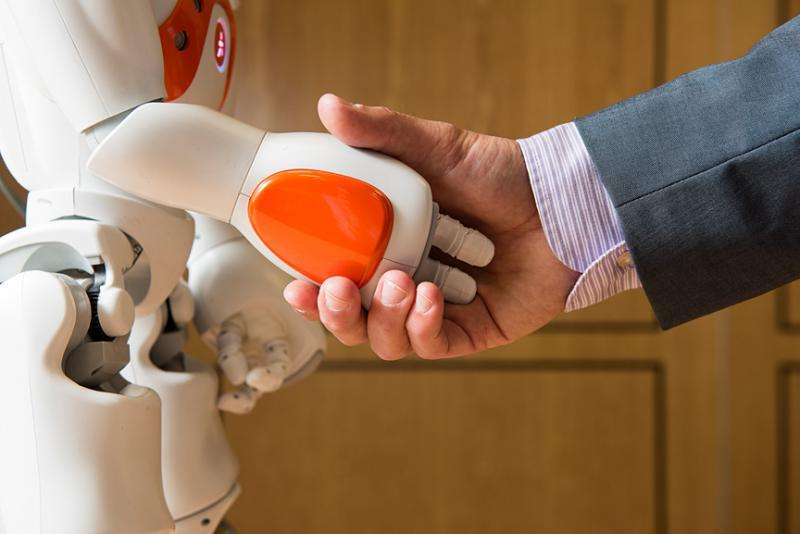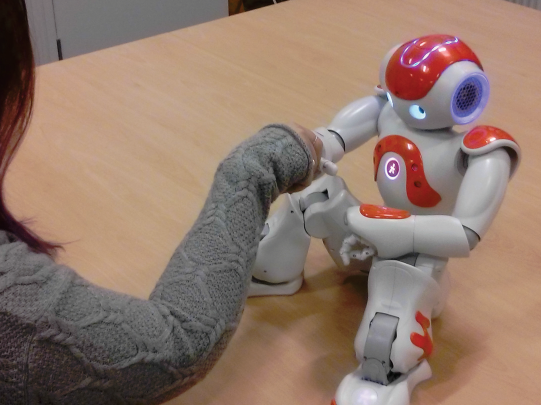Why shaking hands matters (even when it's with a robot)

There's new evidence that shaking hands really does matter when it comes to striking the best deal in negotiations.
The process of shaking hands at the start of a conversation has already been shown to lead to greater cooperation and trust between individuals who interact one-to-one. But now researchers at the University of Bath (UK) have taken this one step further, reporting how social rituals like a simple handshake could be the key to future robotics technology too.
Future robotics
Whereas lots of work has gone into solving the engineering problems related to robotics, much less focus has been placed on how people interact with and through robots – something our researchers believe is critical for future developments.
With rapid advances and huge applications across business, industry and wider society, they suggest meetings through a humanoid robot, such as 'Nao' (Aldebaran Robotics), will provide a much more powerful two-way interactive experience, allowing individuals to have a physical presence in a distant place, as opposed to merely looking through a window, as with Skype or video conferencing.
They point to a range of future applications, from conducting business meetings, through to allowing a person with severely limited mobility a unique opportunity to interact with the world.
Virtual handshaking
Drawing on latest research into human-robot interactions, presented at this year's International Conference on Human Robot Interaction (HRI2015) in the US, the academics from Bath's Department of Psychology focused on the impact of handshaking on levels of cooperation, trustworthiness as well as an individual's willingness to deliberately mislead.
Through a controlled experiment with 120 individuals they set up mock negotiations involving two participants, each randomly assigned a role as either the buyer or seller in a fake real-estate scenario.
By representing one negotiator using the humanoid robot 'Nao', researchers were able to create a system that allowed individuals to shake hands prior to negotiations, even though in different locations.

Using touch sensitive sensors in the robot's hand, a 'virtual' handshake was designed that transmitted a signal when the robot's hand was grasped, making a controller in the distant negotiator's hand simultaneously vibrate and creating a sense of 'connectedness' between the pair.
Their results showed that the act of shaking hands was as important when individuals interacted virtually as when they met face-to-face. Conventional wisdom would suggest that negotiating under such conditions would increase the likelihood that the distant negotiator – who could be thousands of miles away and is essentially hidden from view – would exploit this tactical advantage. Yet, this was not found to be the case.
Valuing the symbolic ritual of shaking hands
Researcher Dr Chris Bevan explained: "This experiment highlights just how important the symbolic ritual of shaking hands is upon the way people come to judge others as being trustworthy and willing to cooperate. Using a robotic avatar, we were able to demonstrate that this effect holds true even when a person cannot see the face of their counterpart."
Professor Danaë Stanton Fraser added: "The formation of interpersonal trust and cooperation are key to future success of computer supported cooperative work, yet the availability of many of the social cues we rely upon when interacting one-to-one are often restricted in these scenarios.
"These findings underline the significance of touch and the simple gesture of a handshake, and will be important as we work to further develop robot systems with valuable applications across society."
How the experiment works
In each session of the experiment, one participant performed their role tele-presently, via a computer, using the humanoid robot 'Nao'. This enabled them to see and hear their opposite number through the robot's inbuilt head camera and microphone, but not be present in the room. For the person present and interacting with 'Nao' they could hear (through 'Nao's in built speakers), but not see the other participant.
Researchers varied the experiment with negotiations conducted either with no handshake at the beginning, or with two types of handshake both with and without feedback. A secondary factor was also considered in that buyers could either conduct negotiations with a tele-present seller, or vice-versa.
89 per cent of research from the University of Bath's Department of Psychology was recently judged to be either 'world-leading' or 'internationally excellent' according to the independent Research Excellence Framework 2014.
More information: Shaking Hands and Cooperation in Tele-present Human-Robot Negotiation, International Conference on Human Robot Interaction (HRI2015)
Provided by University of Bath




















